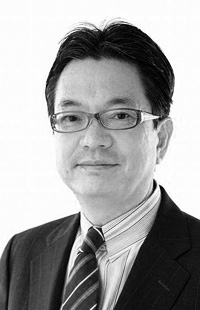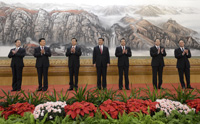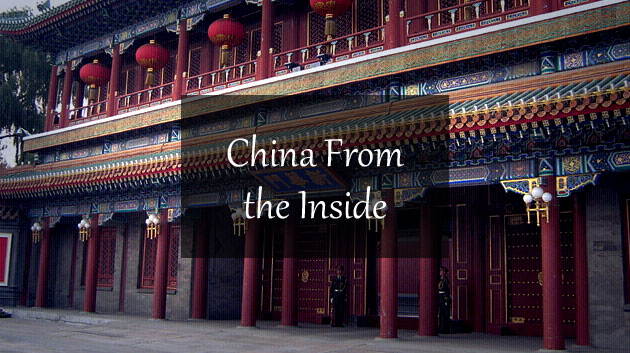China’s New Administration of Conservative Hardliners
Masaru Souma's Column on China
China is beginning its move towards becoming a global empire. The political power struggles in the Zhongnanhai, the central headquarters of the Chinese Communist Party, serve as an indicator for the country’s foreign policies. Masaru Soma, China expert and watcher of China’s head of state Ji Xinping, reports on what’s happening inside China’s ruling elite.

Masaru Souma
Masaru Soma was born in 1956 in Aomori Prefecture. After graduating with a degree in Chinese from Tokyo Foreign Studies University, he joined Sankei Newspaper, where he held positions including head of the Hong Kong branch and assistant director of the foreign news desk. As a Nieman fellow he spent 1998-1999 at Harvard University. He left Sankei Shimbun in 2010, and currently works as a journalist. He has published many books including “Chugoku Kyosanto Ni Kesareta Hitobito” (The People Who Disappeared From the Chinese Communist Party) and “Xi Jinping No Shotai” (The Real Xi Jinping), which he wrote under the pseudonym Kayasawa Izuru. Soma also wrote “Shin Kotei – Hu Jintao No Shotai” (The New Emperor – The Real Hu Jintao) – all published by Shogakukan.
Just after 12 o’clock noon (Japanese time: 1 p.m.) on November 15th, the day after the 18th National Congress of the Chinese Communist Party closed, seven new Politburo Standing Committee members walked out of the Great Hall of the People and onto the terrace, spearheaded by Xi Jinping, the new general secretary of the CCP. They constitute the top tier of China’s new administration.
I watched the event live on the Chinese government news agency Xinhua’s website. The headline was identical with the news I had received 10 days earlier from Hong Kong’s China press department.
Among the seven Committee members, Zhang Dejiang, Yu Zhengsheng, Liu Yunshan, and Zhang Gaoli represent the Shanghai faction that supports former leader Jiang Zemin. Wang Qishan and Xi himself are representatives of the Crown Prince Party (the “princelings”), and they of course support Xi Jinping. As expected, the Communist Party’s Youth League, who is close to the former leader Hu Jintao, was only able to provide one candidate for the Committee – Li Keqiang.
The Shanghai faction and the princelings have close ties, but this time the Shanghai faction has hands down won the political power struggle, constituting a much larger section of the new Politburo Standing Committee.
Conservative Hard-liners and Unchanged Power Structures

The seven newly elected Politburo Standing Committee Members under Xi Jinping on November 15th were, from left to right, Zhang Gaoli (L1), Liu Yunshan (L2), Zhang Dejiang (L3), Xi Jinping (C), Li Keqiang (L5), Yu Zhengsheng (L6), and Wang Qishan (L7) (honorifics omitted). Photoshot/Aflo
On the other hand, concerning the personnel question in this year’s run-up to the Congress, the same press department predicted correctly that Hu would step down from his leading position in the Chinese Communist Party’s Central Military Commission and take his entire faction with him.
If Hu had clung on to his position as head of the Central Military Committee like Jiang Zemin did at the CCP’s National Congress in 2002, an irregular political structure would have followed in which those previously in positions of power would have retained their influence in the background. In this case, the power struggle between the Shanghai Faction and the Crown Prince Party on the one hand, and the Communist Youth League on the other would have continued, and Chinese politics could have ended up on unstable footing. Therefore, there is a strong view that at least stability and group coherence within the new administration were secured thanks to the clear dominance of the Shanghai faction, thus avoiding the danger of a political vacuum resulting from internal power struggles.
On the other hand, the same situation could also become the cause of trouble in China. After all, the Chinese population wants to see political reforms and a revival of their economy, and the Shanghai faction – by far the most powerful group in this administration – constitutes the most conservative circle within the CCP, a camp that could be described as conservative hard-liners with a penchant for implementing the seniority system and preserving old power structures.
Xi Jinping – a Hardcore Communist
Speaking of ideology, Xi Jinping, the man who took the helm in China, has no qualms about declaring that he uses a combination of Marxism, Leninism, and Maoism as a backbone for his own philosophy. Of course if he were not such a hardcore communist, it would have been difficult for him to ascend to his present position in the CCP.
Zhang Dejiang’s family comes from North Korea. As a student, he spent time studying at Kim Il-Sung University in Pyongyang and speaks fluent Korean. According to one source, when he studied in North Korea, he got close with Kim Jong-il’s General Secretary who was the same age as him, and they traveled together during the Secretary’s visit to China. We can consequently assume that North Korea is happy to see Zhang on the Committee. Both Yu Zhengshen and Zhang Gaoli have previously served as Communist Party secretaries in the municipalities Shanghai and Tianjin respectively. Their loyalties clearly belong to the Chinese Communist Party, and both can be classified as conservatives. Liu Yunshan is in charge of the Communist Party propaganda.
The “Wrong People” in Government Accelerate Economic Stagnation
The new Committee members with the most liberal ideological stances are Li Keqiang and Wang Qishan. Li graduated from Beijing University where he had fellow students like Wang Juntao who was actively involved in the democratization efforts and later arrested in connection with the 1989 Tiananmen Square protests. During his student days, Li was likely to have discussed China’s democratization with him.
Married to the daughter of Yao Yilin, a former Politburo Standing Committee member and vice premier, Wang Qishan is a typical princeling. When talented economic administrator Zhu Rongji
was a governor of the People’s Bank of China, Wang advised him as vice governor, making a name for himself as a practical economist. When he served as a vice premier, he was in charge of international finances. He has also distinguished himself as a talented economist in talks with the U.S. concerning the U.S.-Chinese economic strategy and in high level economic talks between China and Japan.
Looking at the other new Committee members, it would make sense for Wang Qishan to become the first vice-premier and take charge of the finances, but looking at what is really happening, it seems like instead, he will become secretary of the Central Discipline Committee, which is responsible for checking party members’ records for corruption and other political dirt. Wang’s new position has nothing to do with economics. This is a clear case of putting the wrong person in charge of the wrong area. As the vice premier, Li Keqiang will be in charge of economic policy. The idea behind placing an experienced economic administrator like Wang in an inappropriate position was most likely to ensure coherence with China’s economic policy making.
However, this ill-advised decision is likely to disappoint other prominent players on the international financial market, and confirms the view that “the wrong people (in the wrong positions could easily be) a crucial factor that is going to accelerate economic stagnation in China” (from Hong Kong’s international financial press department).
In addition, the fact that neither Li Yuanchao nor Wang Yang got a seat on the new Committee has disappointed hopes in Xi Jinping’s new administration. Li was previously the head of the Politburo’s Organization Department, and Wang was the CCP chief in Guangdong. Both had been at the center of political reforms.
The Contortions of the Politburo and the National People’s Congress
Concerning seniority, on the other hand, it is noteworthy that both Xi Jinping and Li Keqiang are in their 50s, while the other five Committee members are between 64 and 67. At the next National People’s Congress in five years, they will be too old to serve, forcing them to step down. The Standing Committee’s average age of 63 is higher than that of the last two boards.
Among the other twenty-five CCP apparatchiks, no fewer than ten are from the Youth League faction, including Guo Jinlong, the chief of the CCP in Beijing, and others close to Hu Jintao. The fact remains that among the seven Politburo Standing Committee members, the Shanghai faction is the most dominant one. It is possible that the contortions both the Politburo and the People’s Congress have gone through are going to result in chaos sooner or later.
In five years, another CCP Congress will be held, and new Politburo Standing Committee members will be elected, but before that we are likely to see another series of fierce political power struggles erupt. This time, the new Politburo stirred up a lot of controversy even before it officially started its ruling term.



















